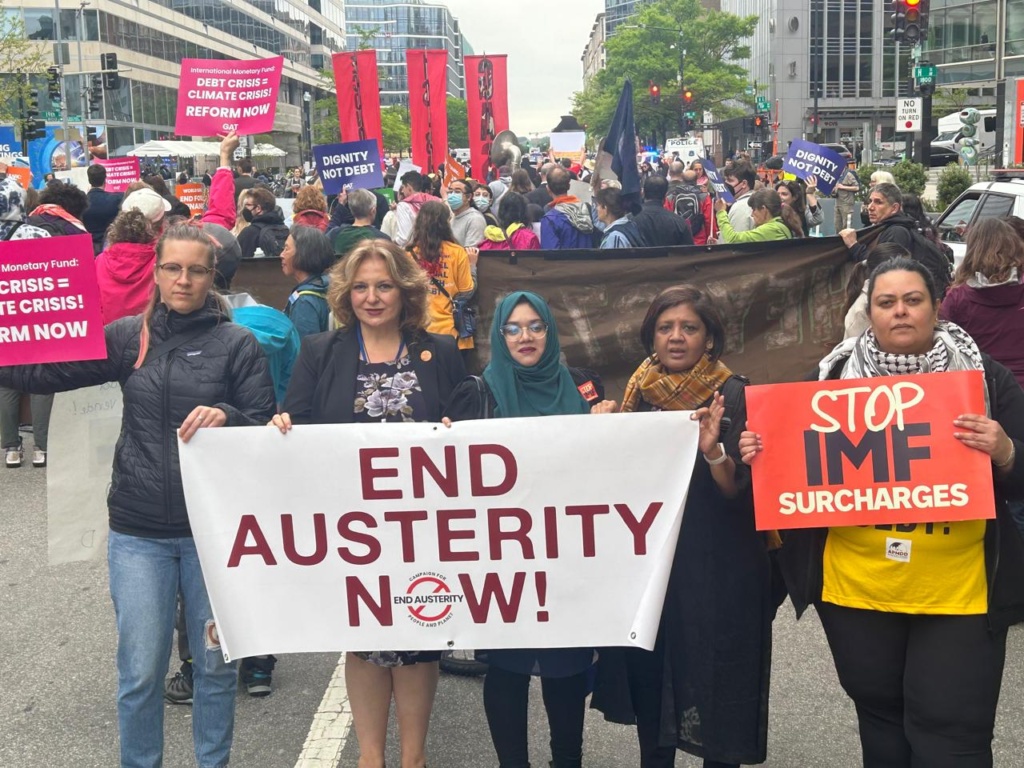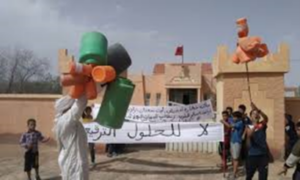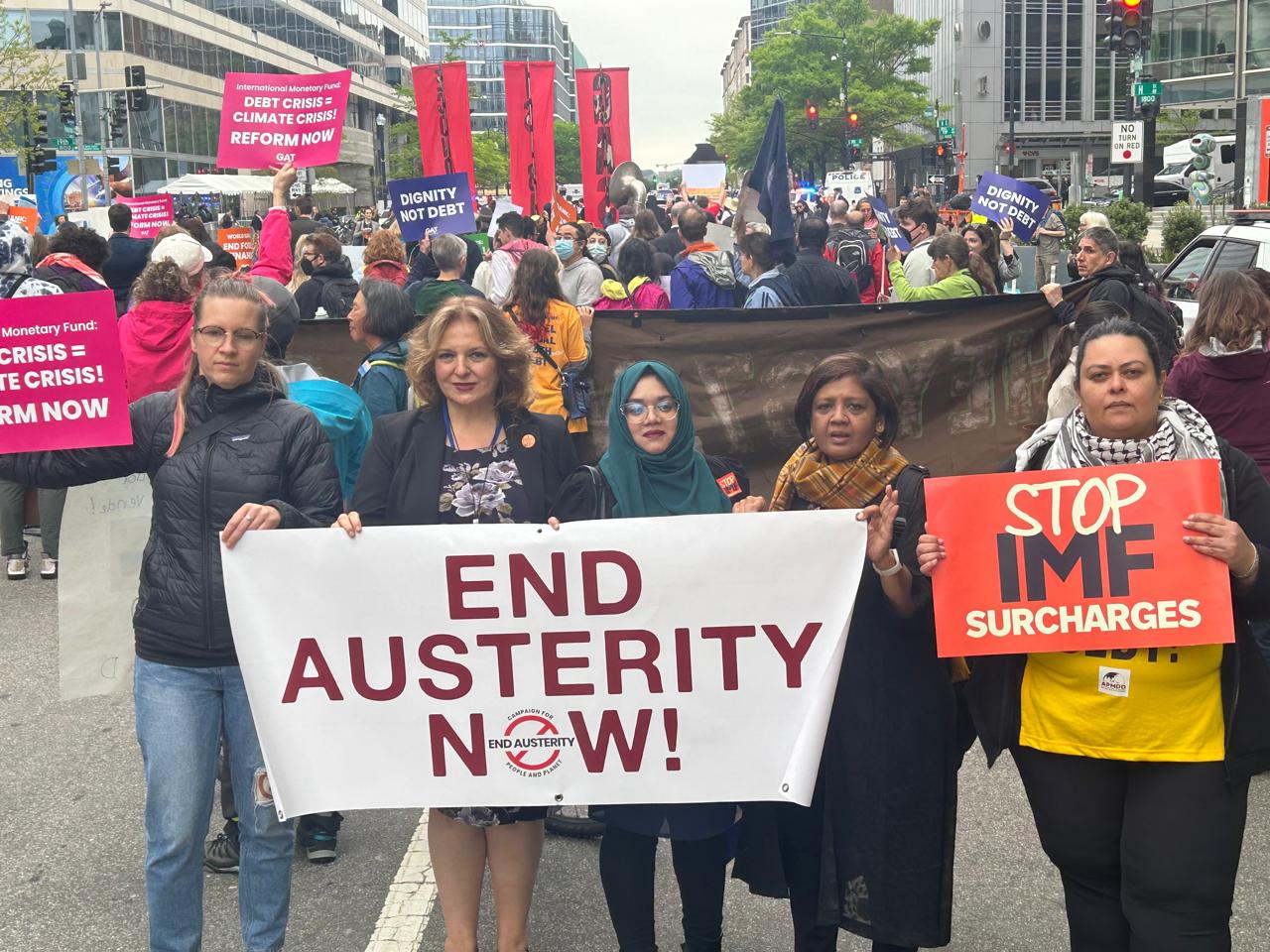The Bretton Woods Institutions (BWIs) – the World Bank and the International Monetary Fund (IMF) – are celebrating a dubious milestone in 2024: 80 years of shaping the global economic order. Established in the aftermath of World War II, these institutions promised a new era of cooperation and prosperity. However, their legacy, particularly for the Global South, is one of neocolonialism, economic injustice, and austerity. The BWIs have perpetuated a system rigged in favor of wealthy nations, furthering economic subordination and hindering development in the Global South. We must highlight that it is not solely the BWIs acting in this capacity, but rather the global economic order they have helped create, with many governments complicit in its perpetuation. This neocolonial dynamic extends to occupation and militarism, with consequences starkly evident in Palestine, as the BWIs continue to promote imperial economic and geopolitical interests. Decades of Israeli occupation and economic strangulation, endorsed by the international community that the BWIs represent, have directly led to the genocide of Palestinians. This is not an isolated case.
This piece summarizes feminist reflections from the MENA region and beyond on the economic, gendered, climate, and other injustices stemming from both the BWIs and the economic and financial structures they dominate. Published ahead of the October 2024 Annual Meetings of the World Bank and IMF, the piece offers alternative analysis and elements of a feminist advocacy agenda, as we collectively struggle to imagine and create a more equitable and peaceful world.

Gendered Impacts of BWIs’ Policies
The blog posts in the 80th anniversary series collectively highlight the pervasive and gendered impacts of austerity measures, economic liberalization, and Structural Adjustment Programs (SAPs) across various countries, particularly in Africa and the Global South. These policies, driven largely by international financial institutions like the Bretton Woods Institutions (BWIs), have systematically disadvantaged women, hindering their access to education, healthcare, property rights, and economic participation, exacerbating existing inequalities, and creating new challenges.
In Egypt, Karim Tarek highlights the effect of IMF-promoted policies such as the liberalization of public health services and rising costs and how they have disproportionately affected women, especially female breadwinners. The cancellation of women’s health insurance subscriptions and the rising costs of services like family planning and prenatal care have led to increased reluctance among women to seek healthcare. Additionally, the economic crisis has pushed women to prioritize their children’s health over their own due to their inability to cover healthcare costs. Furthermore, when it comes to social assistance, Mai Saleh notes how the criteria for conditional cash assistance are unfitting and expose women to further discrimination, explaining how conditional financial assistance programs exacerbate gender discrimination by placing undue responsibility on women, leading to increased gender-based violence.
The situation in Tunisia mirrors this pattern, with female-led households being significantly more vulnerable to extreme poverty compared to male-led ones, according to the piece written by Al Bawsala. Al Bawsala’s article underscores how structural barriers confine women to unpaid domestic work, limit their participation in the labor market, and exclude them from social protection. The piece notes that women’s significant representation in the social, health, and agricultural sectors, their access to leadership positions and land ownership remains limited, contributing to the gender pay gap and economic insecurity. Additionally, it emphasizes that austerity measures have further undermined women’s sexual and reproductive health by reducing access to essential services, including contraceptives and abortion-related care.
Andrea Magnon notes similar issues in Togo, where austerity measures have restricted access to reproductive health services, leading to higher rates of unintended pregnancies, unsafe abortions, and maternal mortality. She further highlights how Structural Adjustment Programs (SAPs) have reduced public spending on education, leading to lower school enrollment rates for girls and increased barriers to completing their education in Ghana.
Furthermore, Imungu Kalevera underlines how Kenya has witnessed widespread outrage from women over a proposed bill that would limit access to menstrual products and maternal services, while also increasing unpaid care work and reducing education funding. This bill reflects the broader impact of BWIs’ economic policies, which have led to higher taxes and cuts to essential services across East Africa, disproportionately affecting women. On a related note, Edem Yaovi Dadzie observes how the deregulation of labor markets across the African continent has resulted in precarious, undervalued work for women, while SAPs have forced women to shift from food crop production to export crops, exacerbating food insecurity and malnutrition.
Globally, the imposition of SAPs and austerity measures has resulted in cuts to social safety nets and social welfare programs, perpetuating structural violence and further impoverishing women and their families, as Andrea Magnon affirms. She further notes how the first programs to usually face budget cuts are family allowances and food subsidies, disproportionately impacting women who bear the brunt of the care burden. Mai Saleh also asserts that cuts in social spending related to welfare perpetuate structural violence through impoverishing women and their families. On a separate note, Fatma Khafagy points to how economic liberalization, while creating employment opportunities, has expanded the informal sector, where women often work in low-paid, insecure jobs without social protection. The resulting income inequality and occupational segregation have limited women’s access to higher-paying jobs and perpetuated economic disparities between men and women.
The Impact of Austerity Measures on Social Welfare
Austerity measures demanded by the BWIs have implications beyond gender: they weaken social safety nets, lead to food insecurity, and negatively impact the climate, harming the well-being of entire communities. The BWIs’ focus on debt repayment and neoliberal economic policies often restricts resources available for governments to invest in education, healthcare, and infrastructure, creating ripe breeding grounds for social unrest and violence.
In Egypt, three pieces pointed to the detrimental effects of debt and austerity on wellbeing, particularly for women. Mai Saleh traced the effects of a doubling of interest payments on Egypt’s debt between 2009 and 2023, from 15% of total public expenditure to 33%; while subsidies, grants, and social benefits were cut from 36% to 17%. At the same time, Egypt experienced an increase in inflation, reaching 31.9% in February 2024, while the cost of food reached 50-60% of the total income of the poorest groups. Wage freezes affected the purchasing power of Egypt’s public sector workers, especially in vital social sectors, leading to a significant decline in public services, especially in popular urban and rural areas, writes Fatma Khafagy. Despite a benchmark for health spending of 3% of GDP set by Egypt’s constitution, Karim Tarek illustrates how spending on health shrunk from 1.4% in 2014 to 1.2% in 2024, with an even more dramatic drop in education spending, from 4% to 1.9% over the same period.
Tunisia also signed an agreement with the IMF in 2013, under which it committed to a set of “reforms”. The contribution from Al Bawsala lists the ways in which the IMF sought to curb spending by, like Egypt, cutting public services, downgrading energy subsidies, and reducing the public payroll. These were complemented by macro policies to promote exchange rate flexibility, reform of the central bank, and the privatization of state-owned enterprises. Ezzaytouniya Makssoud found a similar story in Morocco, where budget cuts and economic liberalization have directly contributed to the unsustainable extraction of natural resources, such as mining and monoculture.
Contributors from beyond the MENA region pointed to similar developments, with Edem Yaovi Dadzie illustrating how public companies across the African continent are being sold off at knock-down prices in order to free up cash as quickly as possible for debt repayment. The privatization of the public companies that used to provide basic services (water, sanitation, telecommunications, electricity, education, health care) has made these services scarcer and more expensive, and much less accessible to people living in rural areas, the majority of whom are women. She points to the failure of austerity measures to lead to real economic development globally, and their impact instead on the deprivation of natural resources and the breakdown of state structures. By focusing on narrow aspects of African development without a comprehensive, historical, socio-political analysis or a well-articulated theory of progress, add Bemnet Agata and Gugu Resha, interventions by the BWIs “fail to address the complex realities and diverse lived experiences within African communities.”
Leena Joshi shared the related example of the World Bank-funded Chad-Cameroon oil pipeline, which resulted in deforestation, loss of biodiversity, and pollution, with many women losing access to land and resources essential for their survival. This was not unique to this project; Leena illustrated how since the 1980s, BWI-promoted policies of trade liberalization, deregulation, etc have encouraged the exploitation of natural resources, leading to deforestation, soil erosion, contamination of water sources and pollution, which disproportionately affect marginalized communities, including women in the Global South.

Image via Ezzaytouniya Makssoud
In Morocco, Ezzaytouniya offered similar examples of infrastructure projects funded by the BWIs, including dams, that lead to desertification and soil degradation, including in the High Atlas mountains, with negative impacts on women-led agricultural activities. In oases such as Zagora, she writes, large-scale farms depleted groundwater, which meant that women now had to walk distances to fetch water from wells. This affects their health and eats into the time they could have spent in other activities, such as education, leisure or paid work.
Beyond the indirect environmental effects of their policies, the BWIs are also still directly funding fossil fuels – to the tune of USD 3.2 billion globally between 2020 and 2022 in addition to support through trade finance, financial intermediaries, and technical assistance, found Claire O’Manique & Bronwen Tucker.
Further, the colonial and extractive nature of the BWIs extends beyond their policy advice to their governance. Bemnet and Gugu outline how the disproportionately white, Global North representation in the development sector overall “manifests in a disjointed landscape, with persistent gaps between visionary aspirations and actual policy outcomes.”
Feminist Economic Frameworks and Global Perspectives on Feminist Economic Transformation
We need a fundamental shift. The current economic order, designed by and for the benefit of a select few, is failing the vast majority of the world’s population. To reject austerity and embrace alternative economic models, we must prioritize justice, equality, sustainable development, and the well-being of all people. This approach requires not only a shift in economic thinking but also the implementation of feminist economic frameworks that center marginalized voices, particularly those of women in the Global South, and challenge the status quo maintained by global financial institutions. Feminist economic approaches emphasize principles such as anti-colonialism, economic sovereignty, inclusivity, and participation, placing the care economy and sustainability at the core of economic planning. These frameworks also integrate local knowledge and context, solidarity, cooperation, intersectionality, non-violence, peace, and social and economic justice, as Farah’s piece highlights.
On a global scale, feminist economic frameworks advocate for a radical transformation of the financial system to one that is rights-based, people-centered, democratic, and transparent. Bronwen & Claire suggest this involves rejecting the policies of the Bretton Woods Institutions (BWIs) and exploring alternatives to finance a just energy transition. For instance, Leena advocates for shifting the focus from GDP growth to well-being metrics, such as the Genuine Progress Indicator (GPI) or the Human Development Index (HDI), which provide a more comprehensive understanding of development by incorporating factors like health, education, and environmental sustainability.
Inclusive policy-making is also crucial, ensuring that women from the Global South are actively involved in decision-making processes related to BWI policies and projects, as Leena stresses. This inclusion can lead to more sustainable and gender-sensitive outcomes, particularly when combined with debt relief strategies that prioritize investments in health, education, and environmental protection, as Leena further explains. Additionally, Claire & Bronwen highlight the importance of supporting women-led environmental initiatives and securing new climate finance goals, such as the NCQG at COP29, as essential steps in advancing a just transition that benefits all, especially those in the Global South.
Alternative Economic Models and Grassroots Initiatives in the Global South
In light of the feminist frameworks and principles highlighted above, there is a growing movement towards bringing feminist economic alternatives that embody those principles to life. As Farah highlights, there has been a proliferation of grassroots initiatives across the Global South that have incorporated feminist frameworks challenging neocolonial economic paradigms through combining local and traditional knowledge with feminist imaginations for the future. Specifically, cooperative and alternative ownership models are emerging as powerful tools for economic justice.
For example, in Morocco, women-led cooperatives have been at the forefront of sustainable farming initiatives. Argan oil production cooperatives not only provide women with economic opportunities but also contribute to environmental conservation, as noted by Ezzaytouniya. Further, awareness programs in Morocco have equipped women with sustainable agriculture techniques, such as drip irrigation and water management, to enhance yield with fewer resources. Amazigh women in the High Atlas mountains play a critical role in natural resource management, engaging in farming and the collection of medicinal herbs and aromatic plants, as Ezzaytouniya documents.
In Costa Rica, Banco Popular, a worker-owned bank, offers green lending facilities to community energy cooperatives and low-income residential solar installations, showcasing the potential of cooperative financial models to support sustainable development, according to Claire & Bronwen. In India, the Self-Employed Women’s Association (SEWA) represents millions of women in the informal sector, advocating for social security, fair wages, and the recognition of care work as central to the economy, as emphasized by Farah. Similarly, Farah also notes that Homenet South Asia, a network that supports home-based women workers, promotes solidarity, skill development, and policy reforms to improve their economic status.
In Latin America, grassroots initiatives emphasize the importance of land ownership and sustainable agriculture. In Nicaragua, Las Brumas, a non-profit trade union, supports women’s land ownership and agricultural production, advocating for the inclusion of women in local governance and providing legal defense and access to basic services, as discussed by Farah. Farah also highlights the Zapatista movement and Vida Nueva Women Weavers Cooperative in Mexico, which embody economic democracy by promoting autonomous governance, sustainable livelihoods, and the preservation of cultural heritage.
The Green Belt Movement in Kenya focuses on environmental conservation and women’s empowerment through community tree planting campaigns and the promotion of sustainable agricultural practices, as noted by Farah. On the level of the African continent, Bemnet and Gugu emphasize that the discourse on decolonization must transform power dynamics and institutional biases, ensuring that Africans, particularly women, are at the forefront of development initiatives. This vision aligns with the broader Pan-African movement, which Bemnet and Gugu argue is essential to protecting the continent from external control and profit-driven interests, advocating for a resilient Africa that prioritizes local strategic visions.
In summary, the feminist economic frameworks and grassroots initiatives highlighted above, as discussed by these various contributors, demonstrate the potential for alternative economic models that prioritize justice, equality, and sustainability. These models challenge prevailing austerity measures and advocate for a global economic system that values the well-being of all people, particularly women and marginalized communities in the Global South. By embracing these principles, we can work towards a more equitable and sustainable future.
Demands for further collective advocacy
- Rather than encouraging governments to shrink public spending, the IMF and World Bank should take a rights-based, people-centered, democratic and inclusive approach and end conditionalities to their lending
- Governments should reverse liberalization, privatization, and wage cuts in social sectors, and the IMF/World Bank should remove these provisions from their loan agreements and economic policy advice
- The Bank and Fund should stop funding ecologically harmful projects and stop investing in fossil fuels, effective immediately, and engage in a reflection process informed by civil society to determine their potential role (if any) in a feminist just transition
- We need a fundamental shift in our economic order, and to embrace alternative economic models that prioritize justice, equality, sustainable development, and the well-being of all people.
- This requires the implementation of feminist economic frameworks that center marginalized voices, particularly those of women in the Global South, and challenge the status quo maintained by global financial institutions.
For more on this, read the blog posts below.


